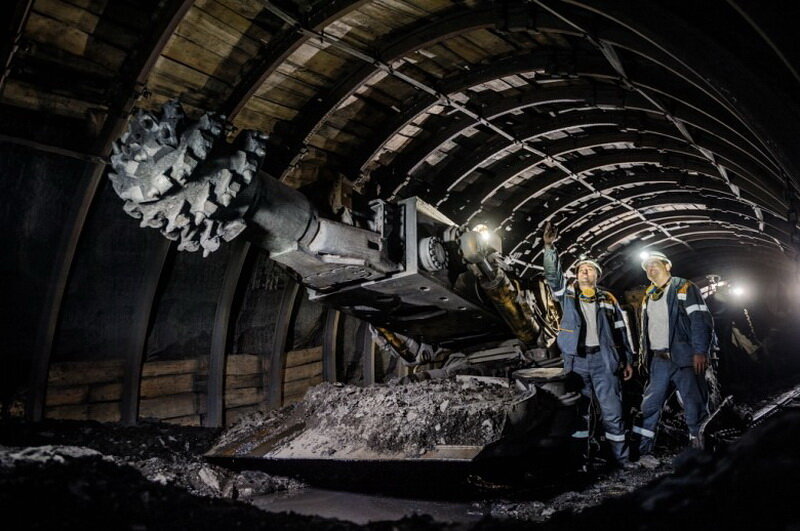President Volodymyr Zelensky promised to go after the oligarchs.
The National Anti-Corruption Bureau (NABU) says that Zelensky’s prosecutors don’t seem to have gotten the memo.
During Zelensky’s tenure, prosecutors have refused to go after associates of Rinat Akhmetov, Ukraine’s richest man, whose company is accused of cheating the public out of Hr 39 billion ($1.4 billion) via the so-called Rotterdam+ coal pricing scheme.
On May 20, the Rotterdam+ investigation was shut down for the fourth time. And this time, prosecutor Denys Demkiv tried to make it impossible for the NABU detectives to revive it as they had in the past. He refused to give them the document with his decision until their three-day appeal window ran out.
In an interview with the Kyiv Post, NABU detectives Mykhailo Romaniuk, Oleksandr Rykovtsev, and Mykola Samoylenko said the prosecutor intentionally sabotaged the Rotterdam+ case by withholding the document. If prosecutors were willing to take the accusations seriously, the case would be in court by now, the detectives argued.
They accused prosecutors of acting like judges in deciding the fate of the case.
“If the prosecutor doesn’t want to prosecute, no matter how you come to him, no matter how you dance in front of him, what arguments or suspects you present, (you get the same answer): ‘I don’t want to’,” said Rykovtsev.
The Prosecutor General’s Office led by Iryna Venediktova and Special Anti-Corruption Prosecutor’s Office (SAPO) didn’t respond to requests for comment.
The press service of Akhmetov’s energy company DTEK, implicated in the scheme, said the company is fully compliant with Ukrainian laws. It said that the Rotterdam+ case was groundless and that NABU overstepped its authority in trying to bring it back multiple times.
“The lack of evidence and farfetchedness of this case has already been confirmed both by the actions of prosecutors and court decisions,” DTEK wrote.
The formula
Rotterdam+ was introduced in 2016-2019 when DTEK faced the prospect of losing its coal mines in the Donbas. The formula also fulfilled Ukraine’s EU obligation to create transparent energy prices.
Ukraine’s coal prices were pegged to the index price of coal in the European coal hub of Rotterdam, the second largest city in the Netherlands. The “plus” refers to the added cost of shipping coal from Rotterdam to Ukraine.
Except less than 5% of coal came to Ukraine from abroad during this period. NABU alleges that this scheme was cooked up by DTEK, which got almost all of its coal from Ukraine and pocketed the transportation money.
DTEK controls 70% of coal power generation in the country.

Miners work in one of DTEK energy conglomerate’s coal mines on Oct. 4, 2017. DTEK is accused of creating a lucrative scheme known as Rotterdam+ which allegedly made Ukrainians overpay Hr 39 billion for electricity.
NABU has evidence of DTEK employees and energy officials working together to enact the scheme. Expert testimony found that paying international shipping expenses for domestic coal cost Ukrainians between Hr 19 billion ($700 million) and Hr 39 billion ($1.4 billion).
Read more: Why authorities are trying to kill key Rotterdam+ investigation
NABU says this is enough to take DTEK and the officials to court.
“Rotterdam+ was an attack on everybody. It got into everyone’s pocket — whoever went out and bought even a Snickers bar during this period was paying extra for the nonexistent delivery of coal to produce electricity,” Rykovtsev said.
DTEK’s lawyers disagree. They say that “were Ukrainians forced to pay for nothing?” is the wrong question. The right question, they argue, is whether the formula was economically justified.
NABU responded that the formula was not economically justified, since forcing people to pay for fictitious delivery broke the law on state-regulated pricing.
Going to court
Whether the case went to court depended on which head prosecutor was assigned to it.
Venediktova, the prosecutor general and Zelensky appointee, kept assigning people that were reluctant to prosecute, like prosecutor Vitaliy Ponomarenko, who closed the case three times. Venediktova ignored prosecutors who wanted the case, like Vadym Sydorenko.
Sydorenko was among the prosecutors overseeing the case from the very beginning. In January, he officially asked to be appointed as a chief prosecutor in the case, arguing he saw enough evidence to go to court. But he was rejected. Sydorenko declined to discuss the matter as he is not authorized to speak to the press about the case.
After Demkiv took over in May, shut the case down and made NABU miss its appeal window, it’s unclear whether the investigation will see the light of day again.
“We were messaging him: ‘Denys, OK, fine, give us the resolution, you know well that we will not be able to appeal (without it), do not deprive us of our right, do not take away this chance’,” said Rykovtsev.

(L) Mykhailo Romaniuk and Mykola Samoylenko, detectives with the National Anti-Corruption Bureau of Ukraine, are discussing the evidence in the case of the so-called Rotterdam+ in the NABU headquarters in Kyiv on June 9, 2021. The Rotterdam+ energy pricing scheme allegedly enriched Rinat Akhmetov’s company DTEK by Hr 39 billion ($1.4 billion) at the cost of Ukraine’s electricity consumers.
The prosecutor refused. When the detectives came to see him in person, he had them booted out of the building. “He called security…and we left,” said NABU detective Romaniuk.
The shutdown of the case means that notices of suspicion to six people, including four DTEK employees and two energy officials, will be automatically withdrawn.
No guts?
From the beginning, Demkiv made it clear that he was rushing to close the case, the NABU detectives said.
The four-year investigation contained 20,000 pages of material and 158 hours of video testimony. Demkiv, who had never seen the case files before, said he’d get through them in two weeks, even though he was on vacation during a part of that time.
“He could have studied the case for half a year to understand it,” said NABU detective Samoylenko.
Rykovtsev added: “He told me he would make the decision. I wrote to him: why are you in such a rush? Figure it out, you’re being so hasty. ‘No, this is what I decided.’ He simply ignored me.”
According to NABU, the prosecutor said he was trying to get it done before his interview for a promotion as the head of a department at SAPO. Yet in the end, Demkiv did not get the job. Whether his interview and his actions on Rotterdam+ are connected is unknown.
Demkiv did not respond to the Kyiv Post’s requests for comment. In an interview with publication Censor.Net, he said that detectives and experts failed to establish that the formula was illegitimate, caused public losses, and had clear victims.

Denys Demkiv, a prosecutor with the Special Anti-Corruption Prosecutor’s Office (SAPO) and a leading prosecutor in the so-called Rotterdam+ case on energy prising is speaking to Censor.Net media outlet on 25 of May, 2021. (Censor.Net.)
He also said that the investigation deadline had lapsed. In all, he believed there was no evidence of wrongdoing and the case had no chance.
NABU said it had three more days to investigate, a fact that was supported by the High Anti-Corruption Court. They also said they had all the evidence needed and the victim was the country of Ukraine.
Both Demkiv and his predecessor Ponomarenko exceeded their authority in the Rotterdam+ case and acted like the ultimate deciders of the fate of the case, Rykovtsev believes.
“We see that people aren’t doing their jobs and are trying to act like some kind of judge: ‘Did they (the detectives) or didn’t they convince me on various categories’,” he said.
Oleksandr Onishchenko, a partner with the law firm Integrites, said that with the way Ukraine’s judicial system is set up, if Demkiv failed to win a case he brought, he had a very real chance to be fired.
Experts
The main argument of whether the case is justified hinges on expert analyses commissioned by NABU.
The Security Service of Ukraine (SBU) and a state bureau in Kharkiv found that the energy regulator’s decision to charge extra transportation costs for domestic coal made electricity almost Hr 19 billion ($700 million) more expensive during 2016–2017.
Private expert Iryna Ped confirmed the NABU’s version that the Rotterdam+ formula caused Hr 39 billion ($1.4 billion) in losses throughout the whole period the formula was active.

Rotterdam has the largest seaport in Europe. Between 2016 and 2019, Ukraine set energy prices based on the price of coal in the Dutch city plus the cost of its delivery to Ukraine. This “Rotterdam+” formula looked like a scam because only a small fraction of coal came to Ukraine from abroad. (Shutterstock)
The expert found herself the victim of a targeted attack in the media. Articles said that she was ruining her reputation by participating in the case or called her analysis into question. One of them was authored by Natalia Drigval, one of DTEK’s lawyers.
Ped’s email got hacked and she received threatening letters. She refuses to talk about it in detail, saying the pressure campaign is now a subject of a criminal investigation she initiated.
The experts’ conclusions are the most crucial part of the case. The main point of disagreement between the detectives and prosecutors was over whether these figures can be called “losses” for the Ukrainian public.
“‘Loss’ is a legal category,” said Onishchenko. “Whether there are losses is something that has to be determined by a lawyer and a court.”
Drigval, a lawyer with the firm Credence that represents DTEK in the case, said that NABU detectives purposefully narrowed the scope of their question to the experts in a manipulative attempt to get the answer they wanted.
“They asked if their calculation is correct and the expert said yes, it’s arithmetically correct,” she said. “The question didn’t concern whether this formula was justified.”
“In our opinion, the Rotterdam+ case has nothing to do with law, justice, or market economy,” DTEK added. “We have repeatedly stated that applying the principle of import pari passu to determine prices for energy products… is the only correct and transparent approach.”
Expert Ped countered that it’s not her job to say if the formula was justified.
“That must be proved by other evidence. And it is for the court to decide,” she said.
